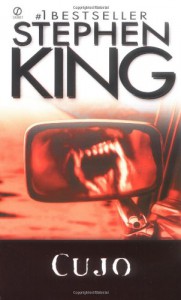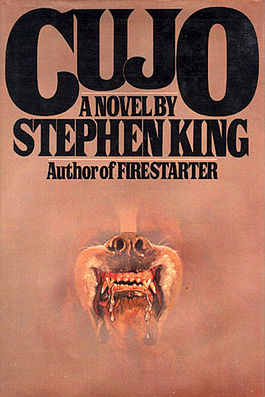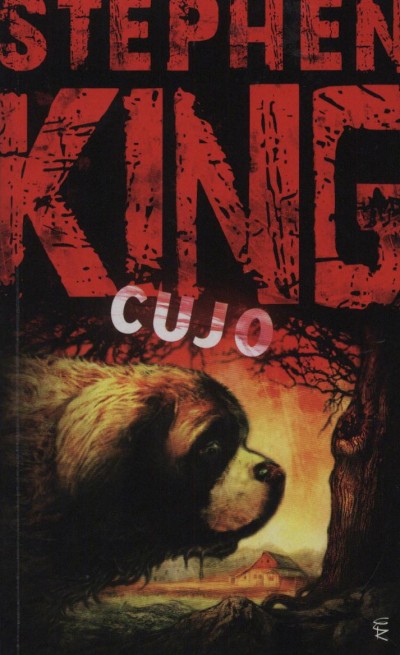
CUJO Review

Synopsis: It happens innocently enough, but doesn’t it always. A big, friendly dog chases a rabbit into a hidden underground cave—and stirs a sleeping evil crueler than death itself.
A terrified four-year-old boy sees his bedroom closet door swing open untouched by human hands, and screams at the unholy red eyes gleaming in the darkness.
The little Maine town of Castle Rock is about to be invaded by the most hideous menace ever to savage the flesh and devour the mind.
*****
Of Stephen King's novels, this is probably the most difficult one for me to read. It's well-written, don't get me wrong -- the prose here is absolutely gorgeous, among King's most direct and yet, somehow, so poetic -- but it is so bleak. There is nary a light in the tunnel. Instead, this novel is King's way of shrugging his shoulders and saying "stuff happens." Like Roadwork before it, Cujo's gritty realism can yield fascinating results, but the journey is absolutely gut-wrenching.
What makes Cujo so fascinating in the context of King's entire oeuvre is this is his first novel that relies totally (or . . . mostly, anyway) on humanistic elements to supply the horror. The supernatural is hinted at, but this is a novel firmly rooted in real life. The events of this story could really happen, and that's what makes it work so well. The horror is totally believable. Before Cujo (Bachman books aside), there was always a supernatural element at the forefront of every King novel -- ghosts, vampires, psychic ability. Those weren't the only elements in their respective novels, but they were responsible for driving the narratives forward. Without those things, those novels would not be what they are. With Cujo, King decided to take a risk, and it worked. It was a deviation from what his fans had come to expect from him, but it worked. With this novel and the book of novellas that would come in 1982, Different Seasons, Stephen King proved he was unafraid to experiment and publish books that didn't fit what was expected of him. With books like Joyland, 11/22/63, and the Bill Hodges trilogy, King is still showing he still is not afraid to play by the rules and would, rather, continue throwing his readers curve-balls. Good on him, I say.

One criticism I often hear about Cujo is the coincidences and their seemingly . . ahem, unrealistic characteristics. This is a novel that moves totally on coincidences. I'll try not to get too spoiler-y for those who haven't read this novel yet, so I'll say this: this is a book that acts as a commentary on the rather cruel indifference of fate. Horror comes from the mundane; because all of the main characters happen to be in the wrong place at the wrong time, the events of the novel are allowed to happen. Some readers get frustrated at that, saying you can almost see the author moving the characters around like chess pieces, and that is totally valid. I can see where they're coming from. It all works for me, though. I think King is totally in on the fact that it all seems so . . . mechanical, the way he moves the characters around. I think that's the whole point. He wants the reader to feel frustrated, exasperated -- just like the characters in the novel. Charity Camber is frustrated about her life choices and her son idolizing his crappy father; Vic Trenton is frustrated that his ad company is experiencing problems and his wife has recently had an affair; Steve Kemp is frustrated that Donna has recently ended the affair with him; Donna Trenton is frustrated at growing older and being so bored -- she feels her life is going nowhere. The characters are frustrated by simple fate, and I think King wanted the reader to feel their pain . . . at least a little bit. Heck, the seemingly "conspiring" coincidences are mentioned more than once by a couple of the characters at different times throughout the narrative. So, yeah. I think King was totally in on the seemingly mechanical (or forced, if you prefer) way the plot is pushed forward.

Another criticism I often hear about this novel is the detail given to the subplots -- especially the one involving Charity and Brett's trip to Connecticut. I've never minded the subplots -- the deviation from the main attraction (mother and son trapped in a Pinto by a rabid Cujo) make the pages spent in the Cambers' dooryard all the more horrific. The characters in this novel are fascinating and I could have read 100 more pages about all of them, truth be told. I don't see the subplots as King trying to beef up the page count but instead fully examining these people he's brought to life. If they weren't interesting I would probably complain and possibly dock a star, but I always enjoy the excursions away from the hot Pinto, if only because they offer a little relief.
In case you haven't picked up on it, Cujo is a grim little novel. I really think King was trying to go for the throat with this one, and he succeeded. It's one of the few novels by the Maine author that twists my stomach into knots; it's one of the few I'm never sure if I'll be able to finish. It's a horrific novel, but the scares are entirely realistic -- they could happen to you or me. Cujo is the official start of what I consider to be King's darkest period -- a period including works such as "Apt Pupil", Christine, Pet Sematary, IT, The Tommyknockers, The Dark Half, and Needful Things. This period will see King explore themes he had never explored before; it will see him going back to themes he had touched on before, getting his final word in on them. In it he will reach the apex of his cocaine and alcohol addictions and then quit the stuff altogether, making for some of his most fascinating -- and most depressing -- works. However, I don't think any of them reach the bleakness of Cujo. . . but, I suppose, we will see.

King connections: This novel takes place in Castle Rock, Maine, site of previous novel The Dead Zone. Several characters from that book pop up here -- either physically or by being mentioned -- such as Sheriff Bannerman, Johnny Smith, and Frank Dodd.
Favorite quote: “It would perhaps not be amiss to point out that he had always tried to be a good dog. He had tried to do all the things his MAN and his WOMAN, and most of all his BOY, had asked or expected of him. He would have died for them, if that had been required. He had never wanted to kill anybody. He had been struck by something, possibly destiny, or fate, or only a degenerative nerve disease called rabies. Free will was not a factor.”
Up next: We're running for our lives (I'm just going by the book's tag-line here; I have no clue what this one's about.) -- it's The Running Man!
 10
10
 1
1











